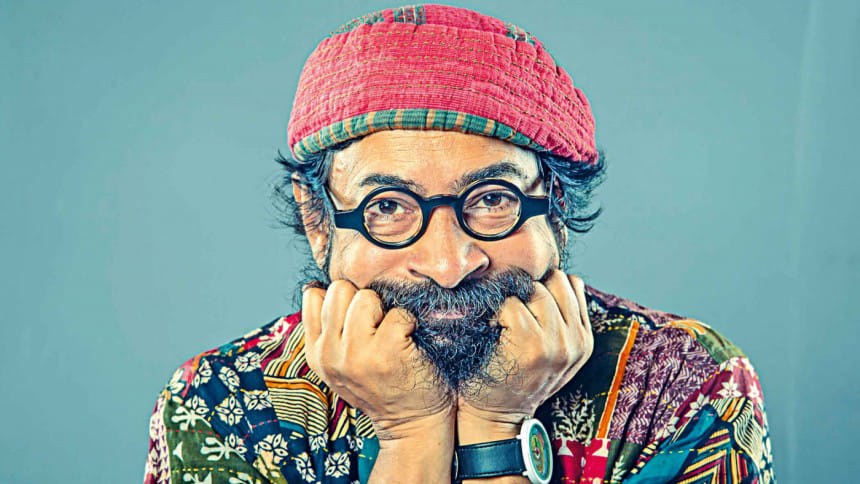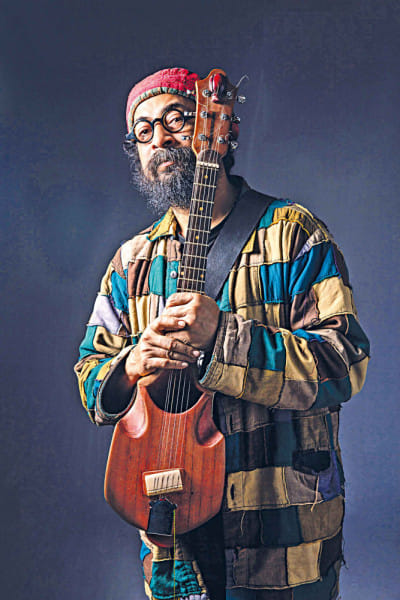Creating new stories

Rafi Hossain: Welcome to Uncensored with Rafi Hossain. Today, we are here with Rahul Ananda. It's great to have you here, Rahul.
Rahul Ananda: I am glad to be here. Thank you for having me. I really appreciate being in touch with one another during these times in such ways. The old world was about staying connected, and this new, strange world is about maintaining as much distance as we get. But, I am hopeful that we will go back to our normal ways once again. Until then, I hope we can all find new ways to be close to each other.
Rafi Hossain: The song you sang for us prompted this question in my mind: do you think, over time, we are getting less and less humane?
Rahul Ananda: I try to have an optimistic outlook. Whenever I perform on stage or get to speak to an audience, I always try to share words of hope and positivity. Sometimes, however, we all are prone to feelings of despair and frustration. At the beginning of this pandemic, I believed that we would come out of this as better people. But, even amidst these times, we see news of violence, rape, discrimination and racism all around us. We treat nature with cruelty, and we are now seeing its effects through natural disasters in Australia, the Amazon and so on. Perhaps, this is God's way of reprimanding us.
Rafi Hossain: 'Joler Gaan' has a unique way of presenting songs. How did you come up with the idea?
Rahul Ananda: Firstly, I am a student of Charukola. I am also a person of theatre. Aside from that, I have always been involved with music because of my family. When I was in my third year in Charukola, I would constantly be stressed and was also under a lot of familial pressure. During that time, a few friends and I began travelling the country when we came across some bauls. I was fascinated by their stories and I felt at peace with them. I gradually connected to other bauls and learnt a lot about our country's culture deeply. During that period, I also began writing, singing, and performing songs at Charukola with a friend of mine. Over time, we would perform the same song several times a day, and began receiving praise. Our songs started gaining popularity in university campuses all over Bangladesh, starting from Charukola and Dhaka University to later at Jahangirnagar University, Rajshahi University and even Dhaka Medical College and BUET. However, I would constantly have people telling me to choose between theatre, music, and Charukola when I loved doing all. It would make me quite upset. Now, you can see that we have a multimedium approach to our performance where we not only present songs, but have theatrical elements, as well as elements of Charukola in it. We also focus on performance art, which is a big part of postmodern art currently. One of our main goals is to break the wall that exists between the performers and the audience; we want the audience to be a part of the live experience.
Rafi Hossain: Does the performance and design for every show remain the same?
Rahul Ananda: No, we change it every time to adapt to the environment. Our performance in your living room, for instance, would be different from one in The Daily Star's seminar room, which would also widely differ from a show in front of 50,000 people. However, despite the number of people, we try to create an intimate presence with the audience. This idea came out from the concept of jol or water, how it flows and adapts and takes the shape of whichever container it is placed in.
Rafi Hossain: Nowadays, music has become more about likes, views, following, and an online presence. How do you feel about this?
Rahul Ananda: Previously, we would think that band music meant having a guitar, drums, and a bass guitar. Nowadays, we see a greater use of acoustic instruments. Some of the forms of music today are labelled as "synthetic", but we need to acknowledge the different tastes that people have. When I was quite young, I was trying to learn the tabla, dotara, flute and so on. During that time, my uncle gifted me a keyboard which had many features, and could even imitate the sounds of other instruments. I told Priyolal Das, my teacher and mentor, that I didn't need to learn the other instruments anymore because I had the keyboard. He laughed and told me that in the end, it's the real instruments that last. Maybe it was his words which I had yet to understand completely, or my own passion, but I did not quit learning them. Now, when I play the flute, I can see that is it still being received by the audience. It is the acceptance and the importance of such instruments that allow us, Joler Gaan, to continue to perform successfully. Before the pandemic, we would have around ten to twelve shows every month, often in front of a large audience. I believe that it is very important to acknowledge the importance of band music. It is often regarded as a Western concept, when in reality, it has been deeply embedded in our history. Our predecessors would perform in groups as well, with instruments like the dhol instead of a large drum set. Even the guitar, which has many variations nowadays, was originated from folk music. Many people will dismiss band music for being Western, but accept the harmonium, when in fact it has a German origin. Even the tabla is not originally ours. One achievement of Joler Gaan that I want to note is that our songs are well received by children as well. Children are the best critiques, and they always speak their mind. It makes me truly happy when I see videos of toddlers trying to sing one of our songs. I love receiving videos of students attempting our songs and even performing them at their institution's cultural programs. Some of them are even using us as an inspiration to create their own music, which makes me beyond happy as that is one of my biggest goals from creating and sharing music. No one should be forbidden from expressing themselves, be it through music, art or whatever medium they prefer.
Rafi Hossain: Tell us more about your instruments.
Rahun Ananda: I actually just finished creating a new one today. Calling it completely new would be a mistake, as once again, it has been inspired by our predecessor's musical instruments which they would make themselves. I named this one Pagla, which my son suggested to match the name of my last instrument, Pagli. It looks like a guitar, with a hollow inside. It uses different kinds of wood, all from our country, and the top is covered with real leather. The strings are actually made from plastic. The sound that it makes it quite deep, like a bass. I only finished creating the initial design, but it has yet to be ready for using on stage.
Rafi Hossain:A lot of people in different professions, especially music, have been struggling recently, especially due to this pandemic. But you mentioned that 'Joler Gaan' would perform multiple shows throughout the month previously. What do you have to say about that?

Rahul Ananda: I believe that we should all focus our energy on our own areas of work. During this pandemic, I tried to help different people in my own way. If you look at my Facebook page, you will see that I tried to encourage people to stay at home and take precautions, be it through songs or a simple status. I did not attempt to provide a cure to the virus, or suggest any such ideas. I never try to, for instance, put up statuses critiquing the government and its actions, because I believe there are people much more qualified than I am who deal with such instances and run our country. I always try to know my limits, be it in music, acting, or writing, and I believe the audience and the people around me know it too. To create a field of work, you need to be willing to put in effort, and deal with the difficult times and the dark side of it as well. For example, on many occasions, we have paid for shows ourselves to raise money for someone, we have given back half the money we received, and we have even paid the bill for the musical instruments of our show when someone was struggling with it. It is only possible to work and keep enjoying it if you are willing to go to such lengths.
Rafi Hossain: How do you view life? What do you believe our purpose is?
Rahul Ananda: Everyone, from Lalon Shah and Rabindranath Tagore to us today have asked this question. For me, the answer changes quite frequently with my perception of life. Often, I feel as though life is like a flowing river, with its branches creating new stories. Other times, I want to focus on the present and believe that the future is out of our control. Sometimes, however, the anxiety about the uncertain future also gets to me. Recently, I have been thinking of life as an experience, and that we have all been sent here to be a part of that. All of our lives are designed in a manner that is unique to us; no two people will have the same experience. Moreover, nothing in this life is guaranteed to us. We are all a tiny part of God's nature. But I am meeting new people and learning new things every day. I may not be sure what I am meant to do with it, but I hope to leave something behind that is helpful to the world, even when I am not in it.
Rafi Hossain:Is there anything you want to add?
Rahul Ananda: You asked me about my "fans" but I want to add that I don't have any, I only have people who are fond of my music. Fans, in my opinion, are for stars who are different from just a popular face. Lastly, I also want to say that I hope that our conversation today, be it the questions or our opinions, helps someone reflect on their life and thoughts someday too. I hope that everyone that loves me works on themselves, and that we can hope to have a beautiful future. Thank you, Rafi bhai and The Daily Star, for having me here today. I have immense love and appreciation for you.

 For all latest news, follow The Daily Star's Google News channel.
For all latest news, follow The Daily Star's Google News channel. 



Comments